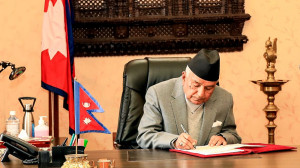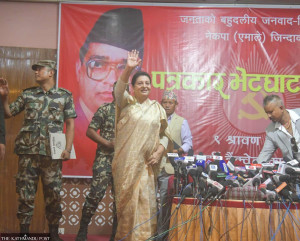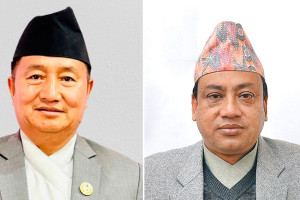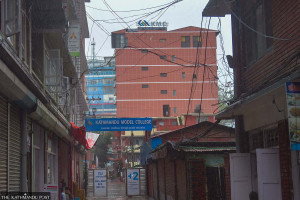Politics
UML cadres start debate on age bar, term limit decisions
Leaders suspect ex-President’s backing of party wing’s activities against official decisions.
Post Report
The CPN-UML has stepped up preparations for its second National Statute Convention after blocking former President Bidya Devi Bhandari’s attempt to rejoin the party.
Leaders, at least from the party’s establishment side, have focused their attention on the convention scheduled for September 5–7 with the belief that the “chapter of the former President rejoining active politics has closed” for now. Recent statements from some of the influential leaders such as General Secretary Shankar Pokhrel also support the claim.
Bhandari had announced her intention to re-engage in active politics within the UML. However, the party’s Central Committee on July 22 shut the door on her. It decided not to approve Bhandari’s membership, stating that it would be inappropriate to welcome a personality having served as the head of state to active politics in the party.
In the meantime, all the top three tiers of the party—the secretariat, the politburo and the central committee—removed the 70-year age bar and two-term limit for the leadership position.
It paved the way for KP Sharma Oli, who is leading the party for the second term, to contest for the third stint as well.
This decision is seen as a major boost for the Oli faction while those lobbying for Bhandari’s return with a plan to elect her the party chief from the next general convention seem to be discouraged.
However, Bhandari’s team looks undeterred.
A party leader said the UML’s intellectual wing has begun collecting opinions through a survey, which goes against the decision of the party’s central committee meeting to remove the age bar and term limit for the leadership positions.
The council has even challenged the party’s internal circular and launched a debate over policymaking in the UML.
Rajendra Gautam, the head of the UML’s publicity department, said that the intellectual council’s survey has drawn the party’s attention.
“Every wing of the party has to follow the decision of the party committees,” Gautam said. “We have drawn their attention regarding the survey they are conducting.”
Council Chairperson Gajendra Thapaliya, however, claimed that the survey was launched to streamline debate on the upcoming statute convention. Arguing that there must be space for debate at the convention, Thapaliya said the study also concerns the general public.
“There is no point holding a Statute Convention if debates are not allowed. There must be space for broad discussions on the statute. It is wrong to impose restrictions on who can and cannot engage in this discourse,” Thapaliya said.
They launched the survey and asked questions despite the central committee instructing party members not to oppose party decisions on issues settled by the committee.
“Our survey will not stop,” said Thapaliya.
In a Google survey, the Intellectual Council asked questions including: “What is your opinion on including a provision in the party statute to prevent individuals from rejoining the positions that they once relinquished?”
The question concerns leaders who dissociate themselves from the party while assuming positions such as the country’s President and the parliament’s Speaker.
Former vice-chair Bhandari had resigned from the party after being elected the head of state.
“What is your view on imposing a 70-year age limit for party office bearers? Do you support the proposal to limit individuals from holding executive positions for more than two terms?” another question says.
The survey checks party members’ views of individuals having served as office bearers at various constitutional bodies becoming active in party responsibilities again.
Some UML leaders close to Oli suspect most of the questions in the Google Survey of the Intellectual Council might have been included at the behest of former President Bhandari.
However, Thapaliya claims that their motive is to strengthen the party committee and it has nothing to do with Bhandari’s intent to rejoin party politics.
UML Standing Committee member Karna Bahadur Thapa, who is openly lobbying for Bhandari’s return to active politics, supports the survey. He argued that the intellectual wing was doing the job that the party should have done.
“The council’s idea of conducting a survey is commendable at a time when the party bars cadres from expressing their opinions independently,” Thapa said. “This survey could shape the idea of what the general public thinks about the party and its leadership.”
Soon after the party’s central committee annulled Bhandari’s intent to rejoin party politics, Bhandari reiterated her commitment to her political comeback.
Some UML leaders close to Bhandari claimed that she is planning to go on a tour of districts to engage with party cadres. Earlier, she had toured key districts in Koshi, Gandaki, and Lumbini provinces before announcing on June 28 her plan to rejoin politics.
However, Raj Kumar Rai, Bhandari’s assistant, denied the tour plan.
Rai said she was busy meeting people from various walks of life, apart from the party members. “She has no intention of going on a district tour yet.”
“The way Bhandari presented herself shows her clear intent, despite the party committees trying to bar her,” said a leader close to Bhandari. “She will take some steps to counter the party decision.”




 28.26°C Kathmandu
28.26°C Kathmandu















